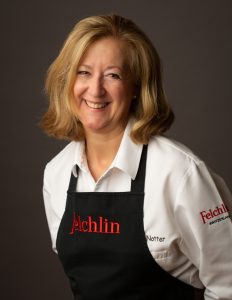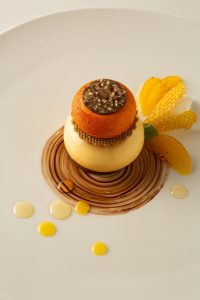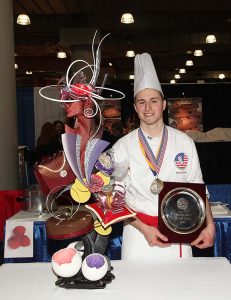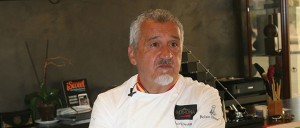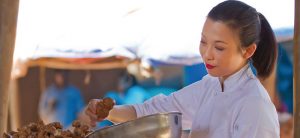Pastry Chefs in USA Pastry Interviews
Susan Notter: “You have to realize who you are coaching, you want to push and drive without breaking them”
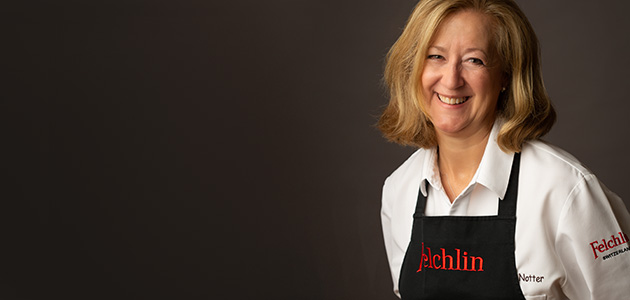
Last winter I spent some time in Switzerland, and I was fascinated with the beautiful landscapes, the snow, and of course the Alps. But what I was most happy about was the deep cultural aspect of chocolate in the life of Swiss people. Everywhere you turn you can find fancy chocolate shops. Switzerland is home to the best chocolate corporations in the world. Decades of chocolate making have made the Swiss perfection this craft.
One of the oldest and most famous chocolate corporations is Felchlin. For over 100 year, they have created covertures; the success story of Max Felchlin. He began by handling honey at the beginning of the 20th century and quickly discovered his passion for cacao products. Over time it has developed into a leading niche producer of noble couverture. I decided to reach out to the Felchlin representative in the U.S.A.: Susan Notter.
For over 30 years, this chef has perfected the art of pastry. Originally from England, she began her passion for pastry at an early age, baking cakes and pastries for her family. Her dream to become a professional pastry chef took her to reach the top of the pastry world. She trained in England in a hospitality management program that included pastry. Then she moved to the U.S in 1992 and it was there where chef Susan Notter developed an indisputable reputation in the pastry world.
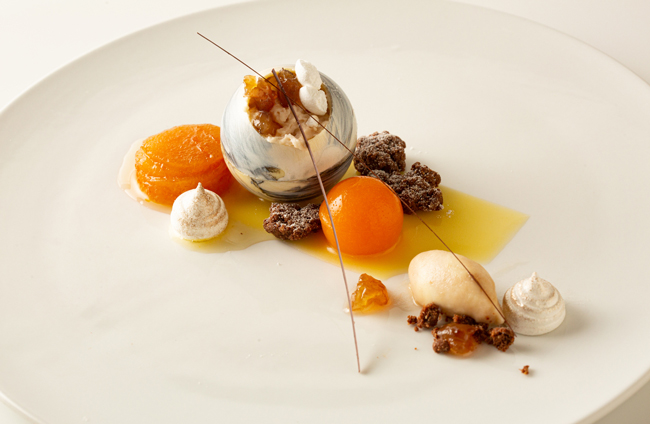
What was your childhood like?
I grew up in England, I was the older of 4 girls. I was born in Birmingham and grew up in the north, I didn’t grow up in a foodie style family but I liked to eat sweet things. The only way to have them was to make them. One of my first pastry memories was making cakes and organizing birthday parties for my sisters’ birthdays. I was very good at it! Back then we didn’t have an internet or food network. I just had to look at cook books and recreate the recipes I read about. In terms of creativity, I just had to draw from myself. I remember making cakes in the shape of a hedgehog. I just had to figure it out, there was no inspiration.
Probably my inspiration and like for good food happened when my family would travel. I remember one holiday in Spain and spending a few weeks there. I remember the things we ate were so much better than any food back home, everything tasted so good, the cheese, tomatoes, and baked goods for breakfast. It was so good and different from what we had everyday. My mother worked and one of my jobs after school was to clean the kitchen. Now I can’t stand having a messy kitchen. I learned that cooking in a clean environment made me feel better.
“I didn’t grow up in a foodie style family but I liked to eat sweet things. The only way to have them was to make them”
When in your life did you decide to pursue your dream to become a pastry chef?
I was probably 15 when I found out I could go to culinary school. I was never good with numbers, it was never my thing. But I love baking, reading, and history. I think the creative aspect of English as a language and if you add food, I thought I would be good at that. I worked in a hotel right after graduating, at 17 years old. I worked the front of the house and when I finished my shift I would go to the pastry shop, they would let me do the desserts. I would get books out and between service hours I would work the back of the house. I learned under the tutelage of chef Aldo Rossi. One of the best pieces of advice chef Aldo ever told me was to look at people’s hands when they work. When you work with someone who knows their craft it’s like a surgical execution when you do something clean and with purpose, and that only comes from experience.
Did you attend any culinary school? What happened after you graduated?
I did a 2 year program at a school in England and once I graduated I decided to move to Germany, in the north centre towards Holland, in the Cologne Dusseldorf area. I got the job and I went to tell my boss and his reaction was: “ What are you thinking? you don’t even know how to make a pretzel!” What makes you think you could go there and be successful?” I thought he would be happy for me, and he actually apologized later, he really didn’t want me to leave. The opportunity was there, it presented itself. I didn’t know anyone and I didn’t speak German at the time. Everything was different, learning German and different pastries. So I took the chance. I had never flown before. This was a great opportunity but now that I look at my family, I don’t know if I would have let my kids go to another country to work. I was there for 2 1/2 years. I always wanted to go to Switzerland. I always wanted to work with chocolate. While in Germany I rotated between the different pastry stations of bakery and chocolate. The owner had eight different locations so we worked in a commissary environment. The pastry shop was split into departments: decor, laminated doughs, layer torts, chocolate, and bakery. I spent 3 months in each area and asked to move from department to the next to learn as much as possible. I love decorating and the person in charge of the department didn’t like me that much, I remember it was tough. I was the only girl working there so as a young woman chef in Europe at the time it was really tough to go up in ranks, especially in the pastry world dominated by males.
It was one of the best jobs I ever had. I was particularly interested in continuing to learn chocolaterie, so I decided to go to Switzerland. The owner of the bakery I worked for was very well connected and he got me a job in Lausanne, Switzerland. By that time I left Germany, I had many friends and everyone made me feel very included.
Switzerland on the other hand was rough, Swiss people are very closed but particularly in those years, I was the only foreigner female working without a work visa. Being an immigrant teaches you a lot about empathy towards other people. It was very cold and was difficult to make friends. It was not an easy experience, it was actually depressing and you go to a new place and they don’t trust you and they are not willing to let you do the job you know you can do better than what my eyes could see. For days they told me to go clean sheet pans.
After 3 months of working there, I got a work visa to go to Zurich and work and it was totally different. My coworkers came from all over the world also working in the chocolate department, mainly French and Swiss guys, it was a great time. It’s funny because of my job I get to go to Switzerland very often. I master my chocolate craft working intensely on a daily basis.
“When you work with someone who knows their craft it is like a surgical execution. When you do something clean and with purpose, that only comes from experience”
Could you name 2 of your mentors and why you admire them?
One of them is my ex-husband, Ewald Notter. He had tremendous drive, always creative, always amazing, always watching over the family school and traveling. We are great friends and I admire his work.
There have always been people who you will always remember, like Aldo Rossi. He was the first chef I worked with and he taught me about work ethics, about thriving, and watching people’s hands when they are working.
Name the important things to consider when you are creating a show piece? Why do you think less chefs are interested in learning this craft?
I think a lot of chefs want to learn it but day-to-day reality gets in the way. You need time, and practice, it’s not just taking a class and learning everything. I think if you are willing to invest a lot of time to learn the craft it is a good investment. The show piece is something that happens when you are done working, but a lot of the time family gets in the way. Obviously there is an interest, the showpiece class was that carrot everyone wanted. I would tell my students this craft is not what your daily life is going to be like. You need a lot of creativity. When you sketch something, it’s always going to come out differently, it’s like a puzzle that you try to put together.
“The showpiece is something that happens when you are done working, a lot of the time family gets in the way. Obviously there is an interest, the showpiece class was that carrot everyone wanted”
Tell us about your pastry competitions and the awards you have won?
I’ve always been very competitive. I didn’t do sports, that was never my thing! But when I was in culinary school I entered a regional competition and won gold. I remember I made some tea pastries. Of course I thought this was so cool and that gave me a little bit of a taste for that. A way to promote the school was to travel and do demos of the things we learned in school, we would go to different competitions and shows. In 1994, we competed in the culinary Olympics in Zurich, and we won a gold medal with distinction. Ewald and I worked together for 15 years and we moved to the USA in 1992. I felt that I could breathe, in Europe as a pastry female chef you are always overshadowed. But here it was like people didn’t matter if Ewald did the demo or I did the demo. I said to myself, “I could really be somebody doing this.” So I competed in an individual program at the ACF in D.C and was invited to be part of the culinary olympics in 1996 and I enjoyed working with them. From there I was asked to try for the national team in 2000 and in 2016 they were struggling getting chefs and I competed and I was very proud. In 2020 in February in a regional USA team all from the east coast, we got gold medal and third in the world. I have been to the culinary Olympics five times. Then there was the Pastry Queen in 2012 and that was in Sigep in Rimini. It’s a big program you have to create: plated desserts, individual desserts, ice creams, an edible art piece, etc.
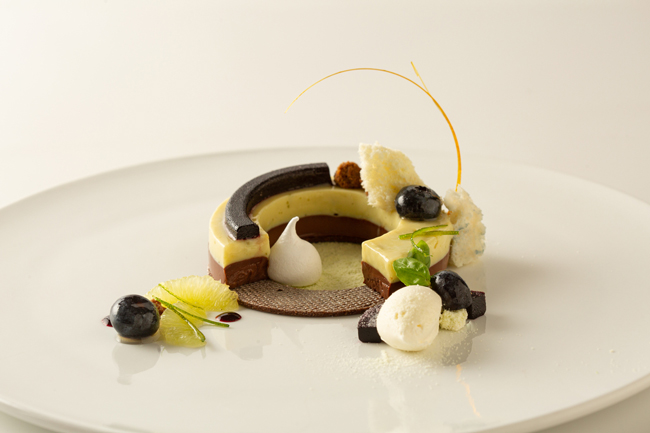
What have been your most rewarding jobs and what do you think the employer valued the most?
I think the most rewarding we had was when we had our own school. When we taught was when we were the most happy, also running your own business and having the decision making be yours, the good and the bad. Having the school was very rewarding. The last job I had I was the Pennsylvania culinary School. They offered me the full-time director position.
I was able to grow the program the way I wanted. At one point we had 3 classes running continually, a morning section and evening section. I would also have guest chefs teaching, we did great field trips in the industry, and placed them in great jobs. I was able to teach them what it takes to be successful in the industry. I had kids that never succeeded anywhere, but it was not about teaching them pastry, it was about showing them how to be better and so much more in life. Turning them around and teaching them a sense of pride and achievement. There was always a goal, when they had to talk about what they made to their families, it was great explaining all these things that 9 months prior they would not have been able to do. It was too easy to get good chef instructors as faculty members. This program elevated the whole school. Everyone makes mistakes, everyone is allowed to make mistakes, a man who makes no mistakes makes nothing. Making food should give us pleasure. You are teaching them to have high expectations without leaving the human aspect.
“The U.SA was set on the podium every time I was there”
Describe how challenging it is to coach and train the U.S Pasty Olympic team?
I think when you coach you got to be able to be in a position where you need to learn the whole program and learn about your competition, I know this by being in cooking shows. You have to realize who you are coaching, you want to push and drive without breaking them. I have experienced many coaches, but the hardest part is finding the competitors for the culinary team. The team is composed of 5 chefs and 2 pastry chefs. Our training site was in Dallas, Texas. We meet once a month and during the training you get into a kitchen turbo chef mode, working from Friday to Tuesday morning, practicing and working on the program. Working on a time frame, it’s very physically difficult to be on your feet 12 hours, mentally stay on track, and of course as you get closer to the competition, it intensifies.
What is the selection process to join the U.S Pastry Team for the Coupe du Monde?
They have tryouts, normally doing something with chocolate like a showpiece, for example. The chefs who go to the selection do what is their major. There is a group of chefs that had competed before. As a team you are not only looking for talent, but also how well their personalities will gel together as a team. Everybody typically travels to a site, and that is challenging. The U.S is so large, in order to get together regularly it’s a lot of money. I don’t know if the U.S will compete this year, especially chefs wanting time off in these covid times.
Decla: “To select the U.S Pastry Team for the Coupe du Monde you are not only looking for talent, but also how well their personalities will gel together as a team”
Tell us about your experience on T.V. Do you recommend chefs pursue this option?
T.V. can be good or bad, a lot of the shows started to change, they want drama, they want action. I love the British baking show, the personality, the dialect, the accent. Early on in the Food Network, they ask questions and the critique is bad. If you have your own business and think you can benefit from it, go for it. Clients love to see you on T.V. The pieces we made were beautiful. It was such an incredible experience. I think it is good recognition that they have to embrace the artistry that we do and don’t play up the drama too much. When I was at school it was a great source of getting more students and the general public in the U.S. There is much more knowledge about sugar pieces and in all culinary arts.
Why did you decide to become a Felchlin corporation representative in the U.S.A.? Why choose this particular corporation from others?
I always knew about Felchlin. I knew the company and quality of the product Stephan Iten will come and do demos, the quality of what they did, the brochures, the printing, the presentation of the product line has always appealed to me. That was part of it. I was looking to move from the school and I wanted to move to something different. I heard about the position by accident. This just sounds like me, the background, the knowledge of the U.S. market and the Swiss market and what they represented. I went through many interviews and I got the job. The chefs that have worked there for a long time are very solid. It was just a perfect fit. I love being in front of people.
If a chef is used to a certain product, I can understand it, making a switch takes a bit of effort and time. I ask them what their needs are and by asking them how I can help them make a better product. I talk about the source of the cocoa beans and interest in Felchlin.
The company has always had a great relationship with the growers. We have such quality products that I can stand behind it and be enthusiastic and be real to the product. In the end, it’s all about education and trust.
“Organic line is the next to be launched, we look for the top cocoa beans, we use less sugar in our giandujas, we focus on the intense nut flavor”
Could you talk about the different Felchlin couverture and products? Where is the corporation heading?
We have couvertures, especially the Grand Cru, that are all single origin sources. Every year we want to introduce new products. No soy lecithin, a new organic line of seven couvertures. That is the priority, heading away from allergens, except for the milk and white couvertures. The stonier message of ethical practices is at the forefront for Felchlin. An organic line is the next to be launched, we look for the top cocoa beans, we use less sugar in our giandujas, we focus on the intense nut flavor. We launch cocoa fruit couverture cocoa mass from Bolivia, they use criollo beans. We are the only ones who harvest this bean. What we have done is take the sweeter pulp that surrounds the pod from Ghana, concentrate the pulp and then add it to the cocoa mass. 78% cocoa content in only two ingredients. It’s very stringent, with acidic notes, rootness, and no refined sugars. It’s a unique product that is not for everyone. Felchlin will invest in the products rather than marketing. What you are getting is truly the best our chocolatiers can give you without the high marketing.
What safety measures has Felchlin Chocolates implemented due to Covid-19? How are sales in the U.S.A.? How do you keep safe?
In terms of Covid, my last trip was in March, Europe was ahead of us, so they implemented the social distancing right away, they wanted to treat us all the same. What applies to every employee in Switzerland applies to us. No traveling , I needed to learn how to make videos and other ways to reach out to customers. Not as a selling thing just by checking on how they were doing. We have Zoom meetings and ship our products 3 or 4 times a year, nothing scheduled until next spring. They don’t want anybody in the plant to be infected so we work from home.
“We have Zoom meetings and ship our products 3 or 4 times a year, nothing scheduled until next spring. They don’t want anybody in the plant to be infected so we work from home”
The Bean to Bar movement is growing more everyday around the world. Small chocolate producers are creating unbelievable tasting chocolate. Do you think big chocolate companies like Felchlin are missing an important slice of the pie? What is Felchlin doing about it?
We are bean to bar on a larger scale. One of my clients went to a plantation in Costa Rica where they harvest some of our cocoa pods and they were surprised to find Felchlin among the chocolatiers who buy the pods. We do a lot of private labels and we are always behind the scenes, in Europe we have a lot of projects with private labels, which is when a customer comes to us and specifies what kind of chocolate they want. We create in a safe environment that has a standard of safety, the movement is dictated now through covid and we are going to see all those places closed. There is no depth in it, it worries me when a manufacturer runs the show. Every time the customer comes and buys your bars, there has to be consistency.
“We are bean to bar on a larger scale. One of my clients went to a plantation in Costa Rica where they harvest some of our cocoa pods and they were surprised to find Felchlin among the chocolatiers who buy the pods.”
As the mother of pastry champions, could you describe how you felt when Nicoll Notter won the Pastry chef of the year competition in 2015?
Seeing him win was amazing, I always felt very proud of him and the dedication that it takes. He was working in Vegas and he was working on the last details for his showpiece, then he landed and drove himself to New York. Seeing him that day telling and explaining people how he made it, answering their questions, made me feel so proud of him. It was his choice to go into the industry and he has the dedication and the eye for detail for the pieces. I think he will make a great husband one day. He went to Switzerland and he tried out for the Swiss competition and he had to get used to a new environment and he did it. He is working on his training and concentrating on the Swiss team for the next Coupe du Monde de la Patisserie.
